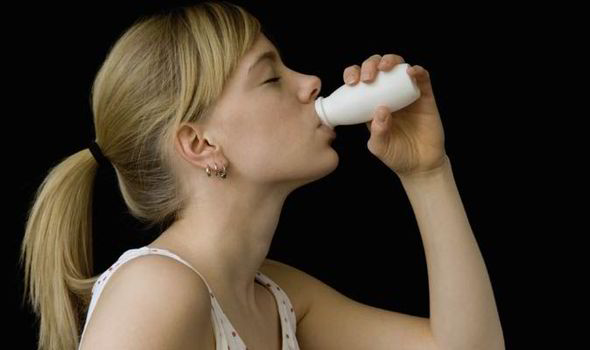A drinkable probiotic formula containing Lactobacillus casei Shirota (LcS) may help prevent type 2 diabetes, according to a study published earlier this year in the British Journal of Nutrition.

In a study of 17 healthy non-diabetic individuals, daily supplementation with the probiotic drink prevented the characteristic drop in insulin sensitivity induced by overconsumption of high-fat foods.
This new study builds upon a growing body research indicating that compositional changes in gut flora can influence the development of metabolic disorders, including diabetes. In one trial, Ejtahed et al. found that type 2 diabetic patients who consumed beneficial bacteria in the form of probiotic yogurt showed improvements in fasting blood glucose levels and reduced levels of glycosylated hemoglobin (Ejtahed, et al. 2012; 28(5):539-543).
Earlier, in 2010, a Danish team showed that the gut microbiome composition in people with type 2 diabetes is profoundly different than that of non-diabetic control subjects. The diabetics showed a lower abundance of Firmicutes, and a higher presence of Bacteroidetes and Proteobacteria (Larsen N, et al. PLoS One. 2010 Feb 5;5(2):e9085).
Findings like these prompted researchers at Loughborough University, Leicestershire, UK, to wonder whether probiotic supplementation might serve a protective or even preventive function against metabolic disease in otherwise healthy individuals.
Protective Effect?
Based on pilot data collected in their laboratory, the Loughborough team had previously observed that insulin sensitivity decreased markedly following short-term, high-fat overfeeding. Excessive consumption of high-fat foods is known to induce insulin resistance, a major characteristic of obesity and type 2 diabetes.
Hypothesizing that probiotics might counter the effects of diet-induced insulin resistance, they conducted a four-week trial with 17 healthy young subjects. Participants were randomized to probiotic supplementation or a control group.
For the first three weeks, all subjects maintained their normal diets. Twice daily, those in the supplementation group also drank a 65 ml bottle of a probiotic fermented milk drink containing LcS, commercially available as a beverage called Yakult Light. At the end of the third week, all subjects took an oral glucose tolerance test (OGTT) to assess baseline insulin sensitivity.
During the fourth week of the study, insulin resistance was induced in all participants via short-term, high-fat overfeeding. Both groups were fed a high-fat (65% of energy) and high-energy (50% increase in energy intake) diet. Those in the probiotic group continued to drink two bottles of Yakult per day.
Preventing Insulin Resistance
After one week on the high-fat diet, the control subjects had gained a body mass of 0.6 (se 0.2) kg (P<0.05). Weight gain among probiotic subjects was smaller and not significant (0.3 (se 0.2) kg, P>0.05).
Both groups showed increases in fasting plasma glucose concentrations following seven days of overeating (5.3 (se 0.1) v. 5.6 (se 0.2) mmol/l before and after overfeeding, P<0.05), though fasting serum insulin concentrations were maintained in all subjects. Fasting plasma triglyceride concentrations decreased after overeating in both groups (P<0.05).
Significantly, whole-body insulin sensitivity in the control group was impaired by 27% following overfeeding (decreased from 5.3 (se 1.4) to 3.9 (se 0.9), P<0.05). In contrast, the probiotic subjects maintained normal insulin sensitivity (4.4 (se 0.8) and 4.5 (se 0.9) before and after overeating, respectively (P>0 .05).
Additionally, overfeeding led to a 10% increase in glucose AUC values in the control group (from 817 (se 45) to 899 (se 39) mmol/l per 120 min, P<0.05). There was no such change in the probiotic group (baseline: 866 (se 49) mmol/l per 120 min; overfed: 888 (se 53) mmol/l per 120 min).
The researchers note that a similar trend was observed for insulin responses, but it did not reach statistical significance (Hulston, et al. Brit J Nut. 2015; 113(4):596-602).
The data suggest that probiotics may help to preserve glycemic control and prevent the insulin resistance induced by overconsumption of high-fat foods. Though the authors state that these preliminary findings require confirmation in a larger placebo-controlled study, the initial observations provide a compelling argument that probiotic supplementation could play an important role in the prevention of type 2 diabetes.
Furthermore, the study provides additional compelling evidence that changes in the microbiome affect multiple metabolic parameters. The authors note that gut microbiota may influence disease development through mechanisms linked to increased gut permeability, metabolic endotoxemia, and systemic low-grade inflammation.
As researchers continue to illuminate the connections between the gut microbiome and human metabolism, they open a doorway to a new realm of potential treatments for preventing and ameliorating some of the most devastating chronic diseases.
END







